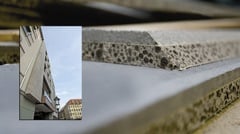Alsecco Airtec is a panel manufactured in a patented process for bonding stone veneers to a lightweight aerated clay concrete. The result is panels up to 3.2mx1.4m that weigh just a third as much as 70mm solid stone cladding.
The panels can be fixed by mechanical anchorage to an aluminium substructure or structurally bonded in ground floor applications and are suitable for use in curtain walling or as a rainscreen on traditional structures as well as lightweight steel and timber framed buildings. They are ideal for prefabrication off-site in modern methods of construction.
Brackets for fixing are stuck to the back of the stone after the lightweight concrete has been drilled out down to the stone. The adhesive can support 500tonnes/m2, which should be sufficient for cladding requirements.
Alsecco Airtec is a German product that was introduced at the Natural Stone Show at ExCeL London last year on the Telling Architectural stand after Telling had entered into a collaborative agreement to develop and distribute the Alsecco Airtec stone system as one of their façade technologies.
Alsecco, part of a major paint company and with their UK base in Stone, Staffordshire, are pleased with the progress of Airtec. Tony Masters told NSS: “We have done pretty well with it.” Well enough to be looking at production in the UK in collaboration with a major stone company by the end of next year.
While four projects they had won for college buildings have been suspended this year due to cash being withdrawn, Alsecco have just won the cladding for the Royal Welsh College of Music & Drama using Jordans basebed Portland limestone that they say they can produce as a 6mm veneer on 16mm backing.
The panels will be storey height with hair joints between the stones.
The concrete is made in blocks that are sawn to the size required and the stone stuck to it, rather than being poured on to the back of the stone in a mould as with conventional pre-cast concrete panels.
Airtec panels, which have been tested to CWCT standards by Taylor Woodrow, are typically about 15% more expensive than the equivalent square meterage of a British stone at 70mm, although Tony believes the cost of the whole project can be cut by a quarter compared with hand setting as a result of the lighter weight and speed of work.

